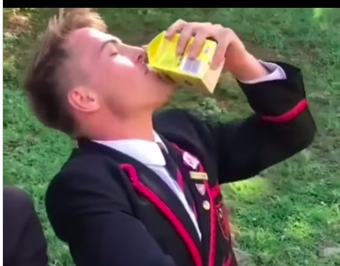Every year, almost like clockwork, the viral video of a Parktown Boys’ High schoolboy bursting into isiZulu phrases after drinking Mageu gets widely circulated on social media.
The white boy goes from speaking English with his mates on a grass embankment while watching sport before sipping the age-old traditional beverage and it sends a whimsical tingle through his body that makes him switch to isiZulu.
View this post on Instagram
The video came about by chance, during the euphoria of the “Woolworth’s water challenge” but Phillip wanted to flip the script on that trend.
“I saw the ‘Woolworth’s challenge’ with the water,” says Phillip Whitehead, “and one of my friends had brought Mageu to school. I turned around and it clicked: let me make the opposite of the Woolworth’s challenge.
“All of my mates said let’s do it! They also wanted to go viral. I honestly thought it was just a gimmick. But we made the video, and I sent it to my friends and some meme accounts on Instagram.
“Then there was a point where DJ Fresh reposted it. When it went viral, I didn’t think anything of it. I didn’t expect sponsors or anything. It just went viral and it was done.”
The video has consistently brought many laughs across the country but very few know the true story behind the viral sensation, now 24-year-old man, Phillip.
His incredible journey began in some of Johannesburg’s toughest surroundings. He was raised in Hillbrow and brought up in an abusive home.
His father was incarcerated, as Phillip was born and he lost his older brother at just 10 years old. His only other sibling was raised in foster care, with the boys separated from each other at a very young age.
View this post on Instagram
“I was born in Hillbrow and my father was in prison at the time I was born. I lived with my mom and her boyfriend in my early years,” Phillip says.
“I stayed in one of those big, tall apartment buildings. My stepdad was pretty aggressive and taught me a lot of things when I was younger – things that you should never teach a child.
“Things like how to use a gun, weapons and all kinds of things.”
By his own admission, Phillip saw and experienced things inside and outside his home that no child should.
“It (home) was a very toxic environment because they’d always have parties,” he recalls.
“I used to walk myself to primary school and back. Back then, Hillbrow was a no-go zone and I saw things on my way to school that no one should see.
“It’s something that you can’t even explain. You’d walk in those alleyways between buildings and see people sleeping and not know if they’re dead or alive.
“I’d see accidents almost every morning on my way to school. Hectic things. But it was second nature to some people. An accident, a dead body on the road, people would go about their lives.
“I’ve seen people jump from buildings.”
For Phillip, everything in his childhood seemed “normal”. He had friends from around the neighbourhood and was lucky not to get involved in any trouble nor get roped into the danger that was all around. He even grew up speaking mostly isiZulu because of his friends.
“That’s when I started to speak vernac (isiZulu). It was the only language I’d speak among my friends when I was young. It was so natural to learn it. My English was not as good as my Zulu at the time,” he says.
Phillip’s father later died when he was 12 but he managed to connect with his paternal cousins, who, for a while, tried to help him navigate life and to bring stability to what was a turbulent upbringing.
However, it was only once he earned a scholarship to attend Parktown Boys’ High School because of his rugby skills that things looked up. Rugby, the sport that got him through the door, ended with a horror knee challenge in a First XV game.
“I played first team and was the second team captain, playing flank. But I got injured in my grade 11 year playing against Pretoria Boys’ High,” he says.
“I assisted with a try in that game. I was so excited to play in the black jersey. They kicked the ball high and one of the props hit me in mid-air. As I landed, my knee buckled and I tore my ACL, and PCL. They said I could never walk again because it was that bad.
“I only got the knee operation done in matric because of funds and stuff. I was walking around with a messed up knee.”
Off the field, however, things went better. His studies improved and he met close friend Myles, whose friendship developed so profoundly that Myles’ mom fostered Phillip and took him under her care.
“When I was in grade 11 and Myles was in grade 10, we started to get close and I started getting to know him,” Phillip says.
“He was a very good kid but sometimes misguided, so I became like a big brother to him. He needed someone he can talk to and who can be there for him.
“He wouldn’t believe the stories I’d tell him about my life. We became very close.”
Although he admittedly still struggled in the classroom – not for want of trying – he persevered until he passed grade 12, becoming the first in his family to do so.
“One of my teachers phoned me while I was at work and he was like, ‘Phil, I just wanna let you know, my boy, you passed matric’.
“I walked out the barbershop where I was working and just cried. I couldn’t believe it.”
Follow African Insider on Facebook, Twitter and Instagram
Picture: Screengrab
For more African news, visit Africaninsider.com


